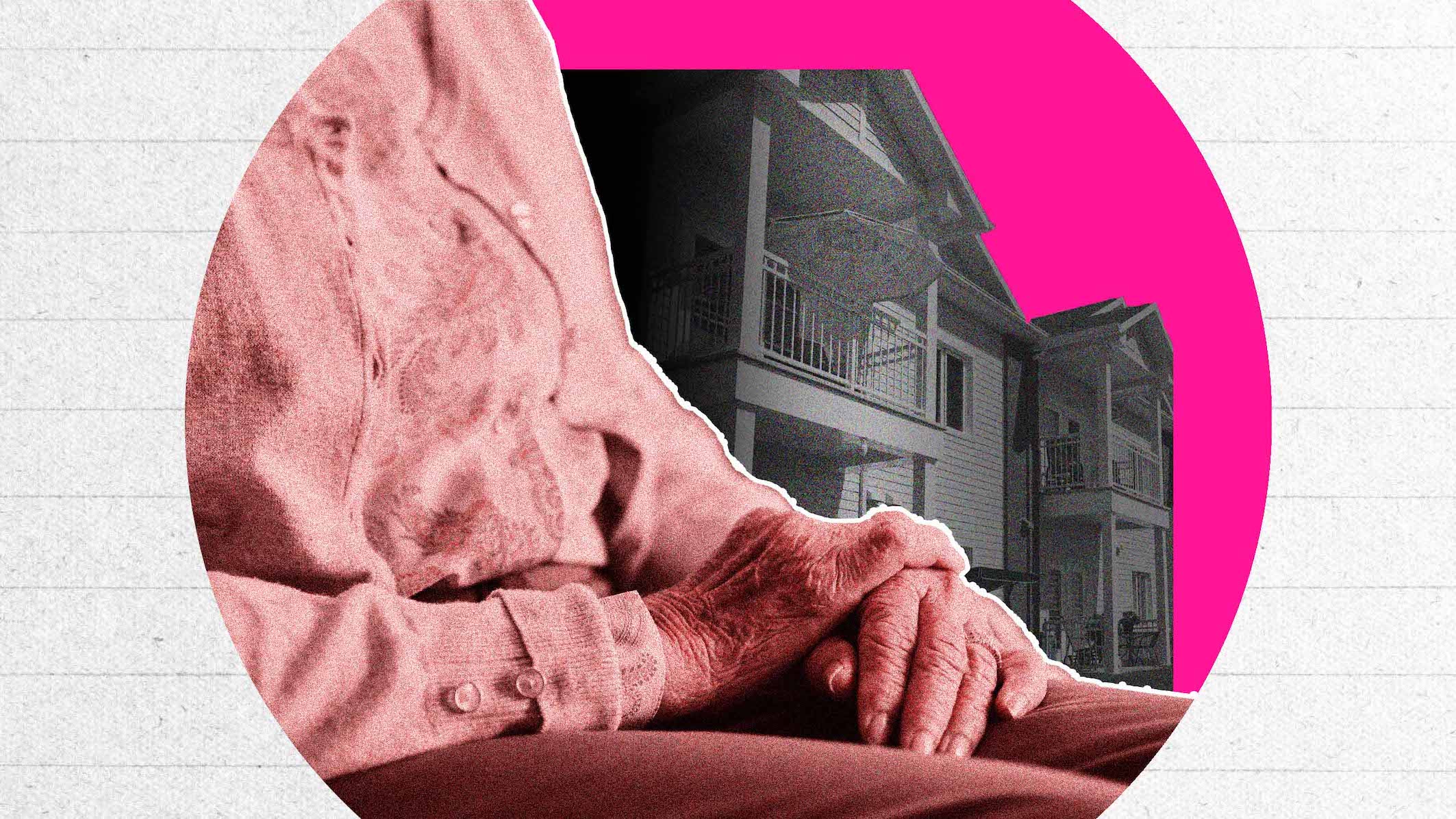Sharon Hunter remembers when she first heard about her partner, Stacy Garrioch’s, dementia diagnosis. It was 2020, and Garrioch had just been diagnosed with primary progressive aphasia—a neurological condition that affects speech and language—at the age of 61. “It was this feeling of sinking dread,” Hunter says.
Because Garrioch couldn’t navigate the healthcare system herself, the work of finding and accessing services fell to Hunter. In an eight-month period, she contacted over 80 different healthcare professionals in their home city of Winnipeg, hoping to find support.
But a lack of services and pandemic restrictions made locating resources all the more difficult. Limits on social contacts meant that people couldn’t visit their home, and Hunter struggled to speak with others about the challenges she was facing without her partner overhearing. “We were caught in this really isolating vortex of the unknown, of terror,” says Hunter. “I could see that she was declining—my health was also declining—but nobody could come and help us.”
Hunter also struggled with the lack of support specific to LGBTQ2S+ folks with dementia. She soon found herself fielding service providers’ assumptions about her relationship to Garrioch. “I had to come out to each and every one of them,” says Hunter. Professionals asked whether she was Garrioch’s sister, aunt, boyfriend or even mother.
These interactions put Hunter on guard, raising concerns about whether she and her partner would be treated differently at each facility. “Before we could get to the source of information or the help, we had to go through that whole barrage of questions,” says Hunter. “It’s almost like having to break down a wall before you get there—and you never know what people’s reactions are going to be.”
Hunter knew coping with her partner’s dementia would be challenging because of the behavioural changes it would bring on. The progressive and terminal nature of the condition didn’t leave her with much hope. “It’s like a ticking time bomb,” says Hunter. “You just know it’s going to get worse, and there’s really nothing you can do to stop it or slow it down, at least at this point.”
But trying to access services as a lesbian couple made it even harder. Hunter wasn’t present when Garrioch received her first dementia diagnosis—she hadn’t been invited to the neurologist appointment, nor had she known she could ask to attend. She found out about Garrioch’s condition through a report.
Hunter learned afterward that it’s common for spouses to accompany their partners with dementia to the meeting, since they may not understand or remember all that’s relayed. She still wonders whether her presence at that meeting in 2020 would’ve led Garrioch to receive her second diagnosis—this time with Lewy body dementia—then, too, rather than two years later. “I think it meant a delay in care for her,” says Hunter. Those two diagnoses might have made Garrioch eligible for more services.
Similarly, Hunter wasn’t initially notified of her partner’s Lewy body dementia diagnosis. Despite being listed as the primary contact, Hunter received the news from Garrioch’s sister, who had called the hospital for an update. Hunter and Garrioch hadn’t spoken to Garrioch’s sister in years. Receiving the news from her was devastating, says Hunter. “I do not see that happening with a heterosexual couple,” she says. “Why would they divulge that information to a sibling rather than to her partner?”
The constant microaggressions and the need to explain her relationship were overwhelming for Hunter. She juggled reaching out to healthcare professionals, informing friends and family of the diagnosis and attending to her partner’s immediate needs, all the while working full-time as an adult counsellor specializing in trauma and self-esteem. “It was exhausting dealing with dementia,” says Hunter. “To add that extra layer of homophobia and heterosexism—the intersection of those issues was almost too much at times for me to cope with.”

Credit: Elham Numan/Xtra
A new national report shows that Hunter is not alone in her experience. Published by Egale and the National Institute on Ageing (NIA) at Toronto Metropolitan University, the report examines the unique experiences and needs of LGBTQ2S+ people living with dementia and their unpaid carers, exploring how these communities face unique barriers to healthcare. “[This] is the first national study of this kind,” says Ashley Flanagan, a co-author of the report and a research fellow at the NIA. “We’re really just starting the conversation of what we can do better.”
Nearly 452,000 Canadians aged 65 and above were living with diagnosed dementia in 2017, according to the Public Health Agency of Canada’s most recent data. The true figure is likely greater, since this statistic doesn’t account for those with young onset dementia and those with dementia who have yet to be diagnosed.
With the number of Canadians aged 65 and older expected to reach nearly 12 million people—almost a quarter of the population—by 2051, researchers anticipate that dementia will become more common. For many queer and trans people, this raises questions about access to affirming healthcare services as they age.
Egale and the NIA’s report points to a lack of conclusive research on whether dementia is more prevalent among LGBTQ2S+ Canadians. However, Flanagan says research from other countries suggests the systemic marginalization faced by LGBTQ2S+ people may put them at greater risk of developing dementia.
“This current generation of [65+ queer and trans] folks is carrying with them a lot of shifts in their rights and their freedoms, and the impact that those have had on whether they’re able to access care,” says Flanagan. Factors such as substance use, social isolation and housing and income disparities—which are more common among queer and trans people—may also heighten LGBTQ2S+ peoples’ risk for dementia.
As Hunter and Garrioch’s case shows, once queer and trans people are diagnosed with dementia, service providers often fail to recognize the diversity of ways in which people become carers for them. Flanagan says one carer participant described a shift that happened within five years of her partner receiving her diagnosis: new healthcare providers began assuming that her partner was her mother. “Who they are as partners really just evaporated,” says Flanagan. “They were not feeling seen as the person providing care and support.”
The report’s name—”Coming Out and Coming in to Living with Dementia”—mirrors how many LGBTQ2S+ people and their carers likened adjusting to life with dementia to the isolation they felt when they came out earlier in their lives, says Flanagan.
For trans people with dementia—many of whom have stayed in the closet most of their lives—the stakes can be particularly high. Fear of facing transphobia often forces them to hide their identity from service providers, says University of Ottawa social work professor Alexandre Baril.
Baril and fellow University of Ottawa social work professor Marjorie Silverman are leading a project on the experiences of trans older adults with dementia and their support networks. The two hope to address a lack of dementia research that centres on trans and non-binary communities. (None of the participants in Egale and the NIA’s study were trans.)
“One participant’s hormone therapy was completely cut off by a medical professional after they received their dementia diagnosis.”
Participants in Baril and Silverman’s research describe facing everyday discrimination, such as misgendering and doctors denying them gender-affirming care due to assumptions about their dementia. One participant’s hormone therapy was completely cut off by a medical professional after they received their dementia diagnosis, says Baril.
Another participant had been seeking a redo of a gender-affirming surgery he’d undergone in the 1970s. As he got older, medical professionals refused to sign off on the surgery, citing his age and possible health interactions. When he was diagnosed with dementia, the possibility of surgery went out the window, says Silverman.
According to Silverman, healthcare providers often draw on the language of vulnerability, fragility and possible interactions with other diagnoses to withhold gender-affirming care from trans people with dementia. “In the literature, there is a common theme of a lot of gatekeeping around surgeries and hormones,” she says. “There can be more prevalence of having other types of medical diagnoses as you age, and some doctors will look to any of that as an excuse to say, ‘Well, you know what, it’s not a good idea to go forward with surgery.’”
Baril and Silverman’s participants also point to cases where medical professionals didn’t take their gender seriously because of their condition. “It was just seen as a side effect of dementia,” says Silverman. Providers often view health issues either through a trans lens or a dementia lens, erasing parts of folks’ identities. “There are different ways where ableism and cisgenderism compound,” says Baril. “The two systems of oppression work together to invalidate both the cognitive abilities of the person and the gender identity of the person.”
Stereotypes about people with dementia being confused ultimately take away from folks’ agency, regardless of whether they’re cis or trans. “Often, people with dementia are just labelled as incapacitated in all spheres of their life, even when they’re still very, very capable of making a lot of decisions,” says Silverman.
Respecting the consent of someone with dementia begins with including them in as many decisions as possible, adds Silverman. Having multiple conversations instead of one-time chats can help them understand the decisions being made. A trusted individual who knows the person’s nonverbal signals and speech patterns may also be able to translate.
“Sometimes people fill out advance directives too, that state what they want for the future,” says Silverman. “Trans communities are pushing that, for fear of all these domino effects and consequences.”
While some trans people living with dementia conceal their transness to access better healthcare, that isn’t always an option. “At some point, it’s just impossible because of the proximity and the kind of care some of those people with more advanced stages of dementia need,” says Baril.
As a result of fear and discrimination, trans people with dementia often face limited avenues for support. Care tends to be restricted to a small circle of trusted people, as individuals turn away from transphobic institutional and organizational resources.
Carers then take on the crucial work of helping trans folks with dementia manage day-to-day tasks, which become more difficult due to their condition, says Silverman. From arranging haircuts and helping them get dressed to ensuring they take their hormones on time, carers often help their loved ones sustain their gender presentation.
But not every trans older adult has access to a support network. One participant described being isolated from her biological family, and not yet having built up a chosen family because she transitioned later in life. “For her, it was a big concern of like, ‘Who is going to help me?’” says Silverman.
Flanagan would like to see a greater range of care options, from closed spaces for queer and trans folks living with dementia to general supports that are LGBTQ2S+-affirming. Breaking down LGBTQ2S+ folks’ fears about service providers invalidating their identities and relationships also requires a cultural shift. “The only way to do that is a really concerted effort to transform that heteronormative, cisnormative structure within healthcare that has traditionally been there,” says Flanagan.
That starts with education and training, such as through Egale and the NIA’s e-modules for carers and dementia support professionals. The online courses trace the stories of two fictional LGBTQ2S+ people with dementia and their carers, who are modelled after the study’s participants. The introductory programs explore how carers can navigate changes in their caring relationship and better advocate for their loved ones, and how service providers can foster more inclusive spaces and interactions.
Flanagan adds that service providers could signal their support to LGBTQ2S+ commmunities by using visual symbols such as the Pride flag and queer couples on their public-facing materials. These images could help break down stereotypes of older folks and their relationships.

Credit: Elham Numan/Xtra
For Hunter, this specific, inclusive messaging is necessary. When she first found out about a young onset dementia carer support group run by the Alzheimer Society of Manitoba, she was reluctant to join. Hunter grilled the facilitator about whether she’d be welcomed. “I think I even said, ‘I do not have the energy to deal with any kind of homophobia, because I’m dealing with as much as I can right now,’” she says. “‘I need to know if this will be a safe place for me.’”
Hunter has since attended the monthly support group for over a year. It’s been an accepting space where she can connect with others about the challenges of caring for their loved ones.
Over the past few months, she’s had conversations with the facilitator about the importance of staff training and inclusion statements at the start of the group’s sessions. She’s already seen changes happen. Hunter says the Alzheimer Society of Manitoba promised to introduce a statement speaking to specific marginalized communities as a standard greeting for all support groups. “It makes a huge difference, when you know that an organization is willing to step out of their comfort zone and learn what they don’t know,” she says.
In March, Garrioch moved into a long-term care home, about a 40-minute drive from where Hunter lives. The home’s Pride display and welcome signs for queer and trans folks have made it feel like a welcoming space. Hunter has never had to come out to the staff there. “I feel like I can just be myself,” she says. “I can just be somebody whose partner has dementia, and I do not have to put on my advocacy cloak.” Hunter tries to visit her partner once a week, taking breaks in between for her physical and mental health.
Hunter is still feeling the effects of carer burnout. While Garrioch moved into supportive housing last November, Hunter hasn’t recovered from the physical, mental, emotional and spiritual tolls of caring for her partner at home. “I am such a reluctant caregiver and such a reluctant advocate,” she says. “I don’t want to be having this experience.”
Hunter’s advocacy only got her so far. While she was able to find the carer support group, a speech-language pathologist, an occupational therapist and a home-care coordinator, she has struggled to access financial and emotional supports. She wishes there’d been a navigator to help her sift through resources. “My partner needed a village and I needed a village,” says Hunter. “We kind of cobbled together a little bit of that, but it would have been really great if there had been more things in place for us.”
While Hunter’s support group has been welcoming, she worries that could change. “Every time somebody new comes, there’s that feeling inside of me again of like, ‘Ugh, at what point do I mention my partner is female?’” Hunter says. Joining a support group specifically for queer and trans carers would connect her with folks who can relate to the barriers she and her partner face.
Mainstream organizations need to build more inclusive supports, but, Hunter points out, the onus should also be on LGBTQ2S+ groups to focus their programming on seniors more often.
“I could know that my partner would be accepted, I would be accepted, our relationship would be accepted,” says Hunter. “Then I would just be dealing with the dementia.”
Ultimately, Hunter says, organizations need to connect with each other, identify service gaps and proactively reach out to families in order to free carers from the burden of building their own support network. “We’re losing our person, and we’re losing our future,” she says. “We’re having to be face to face with this grieving and this really horrible reality. And so more support is essential.”


 Why you can trust Xtra
Why you can trust Xtra


